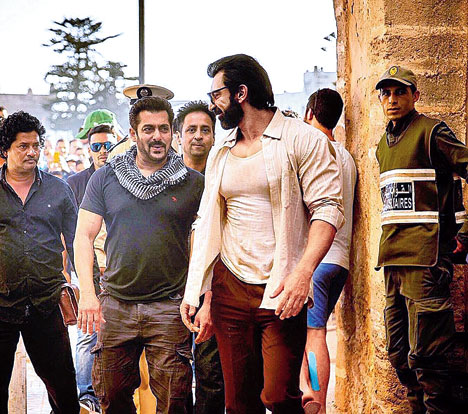
Tiger Zinda Hai — Salman Khan’s December 2017 blockbuster that made close to Rs 600 crore worldwide — premieres this Sunday (March 18 at 1pm on Sony MAX). t2 caught up with its director Ali Abbas Zafar — who is currently on a recce in London for his upcoming Salman starrer Bharat.
Does the TV premiere of a film elicit the same kind of emotions as its theatrical release?
Yes, of course! After a film goes out of theatres, it lives on in satellite and television. And that’s where the actual strength of a film is seen. I am very happy that many more people will watch Tiger Zinda Hai. It makes me anxious and also brings in a lot of excitement. The film has done huge numbers at the box office, but the footfall has just been a little over 3 crore in a country with a population of 120 crore. So not even one-tenth have watched the film till now. Hopefully, people will like this film on satellite.
Do TRPs keep you on tenterhooks as box-office numbers would?
It’s different. When a film releases, people spend their money to go and watch it in the theatres. But when it comes on TV, it’s an open invitation for everyone to watch it. And that’s when we gauge how much a film has had an impact on an audience even after its theatrical run. A lot of people who missed out on watching it in cinemas will now watch it on TV. Yes, I am always interested in the TRPs… what numbers are notched up in the premiere as well as the subsequent times it’s shown on TV.
It’s been close to three months since Tiger Zinda Hai released. What’s been the best thing anyone’s told you about the film?
Well, there’s been all kinds of feedback. I’ve visited theatres and interacted with audiences when the film released. I’ve got an idea of the film’s pluses and minuses from these interactions. As a director, you conceive a film from a certain point of view, but when the film goes into the audience, there are different points of view that are thrown up.
For Tiger, I would say, it’s been largely positive. I’ve now been travelling — I am in London now and I was just in New York — and everywhere I go, the common thing I hear is that people liked the film so much because it’s relevant to what’s happening in the world today, whether it’s extremism or the fact that we are all fighting a common enemy. The idea of humanity above everything else has worked big time for the film.
Looking back, is there anything you would like to change about the film?
Oh, lots of things, but I don’t want to speak about it… I would rather fix them in my next film! (Laughs) Actually, these are all very technical things… the sound could have been better, I could have shot a certain scene in a different way, I could have written a moment in a way that would have made it more impactful….

This was a rare Bollywood film in which the antagonist, played by newcomer Sajjad Delafrooz, became immensely popular, with many going back to the theatres for him. Did you see that coming?
All over the world, script and characters are now being given a lot of importance when a film is being made. The actors come next. Content-driven films are doing well. When we were casting for this role (Abu Usman), we wanted someone who would look 100 per cent authentic — his speech and body language should make us feel that he belongs to that land. Today, people look at the little nuances when they watch a film and Sajjad played his part so close to reality that he was instantly acclaimed.
You are all set to make your third film, called Bharat, with Salman Khan. Has your professional equation now reached a place where you both know what the other wants in a shot without spelling it out?
After two films (Sultan and Tiger Zinda Hai), we understand each other much better now. There are conflicts too, but they are all for the betterment of the film. When you have someone like Salman Khan in your film, he comes in with his own creative point of view and as a director, you have to be open to that. But now we get along very well not only as actor-director, but also as people.
Your films have always been large ‘event’ films with a superstar in the middle. Do you see yourself making a small, intimate film anytime soon?
Ya, I would love to! See, I always believe that the commerce of a film lies in its story. If a story excites me and mandates that I work with newcomers, I would love to do that.










